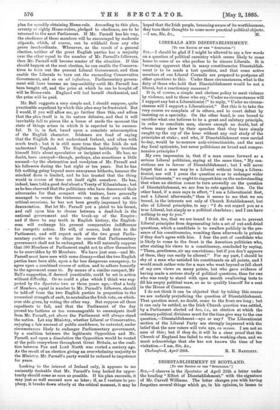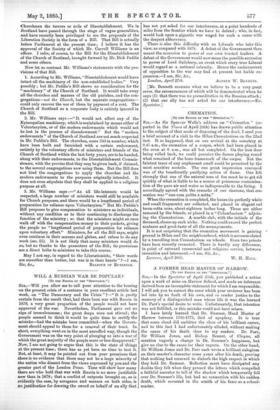DISESTABLISHMENT IN SCOTLAND.
LT0 THE EDITOR OP THE "SPECTATOR."]
Sin,—I observe in the Spectator of April 25th a letter under the heading "Effect of Disestablishment," with the signature of Mr. Carvell Williams. The letter charges you with having forgotten several things which go, in his opinion, to lessen to Churchmen the terrors or evils of Disestablishment. We in Scotland have passed through the stage of vague generalities, and have recently been privileged to see the proposals of the Liberation Society in the form of a Bill. That Bill is actually before Parliament at the present time ; I believe it has the approval of the Society of which Mr. Carvell Williams is an officer. I refer, of course, to the Bill for the Disestablishment of the Church of Scotland, brought forward by Mr. Dick Peddie and some others.
Now let us contrast Mr. Williams's statements with the provisions of that Bill.
1. According to Mr. Williams, "Disestablishment would leave intact all the machinery of the non-established bodies." Very possibly ; but Mr. Peddie's Bill shows no consideration for the " machinery " of the Church of Scotland. It would take away all the churches and manses of the old parishes, and the congregations—not the Church, but the separate congregations— could only recover the use of them by payment of a rent. The Church of Scotland as a corporate body is entirely ignored in the Bill.
2. Mr. Williams says :—" It would not affect any of the Episcopalian machinery, which is maintained by means either of 'Voluntaryism, or of the modern endowments which would not be lost in the process of disendowment." But the "modern endowments" of the Church of Scotland are not much respected in Mr. Peddie's Bill. The churches, some 340 in number, which have been built and furnished with a certain endowment, -entirely by the voluntary efforts of ministers and friends of the Church of Scotland within the last forty years, are to be banded, along with their endowments, to the Disestablishment Commissioners, with the proviso that they may be given back, if claimed, to the several congregations now using them. But the Bill does not bind the congregations to apply the churches and the modern endowments to the purposes originally intended. It does not even stipulate that they shall be applied to a religious purpose at all.
3. Mr. Williams says :—" As all life-interests would be respected, a large number of ministers would still be available for Church purposes, and there would be a lengthened period of preparation for reliance upon Voluntaryism." But Mr. Peddie's Bill proposes to give compensation to ministers as individuals, without any condition as to their continuing to discharge the function of the ministry ; so that the ministers might at once walk off with the compensation-money in their pockets, giving the people no "lengthened period of preparation for reliance upon voluntary effort." Ministers, for all the Bill says, might -even continue in their manses and glebes, and refuse to do any work (sec. 25). It is not likely that many ministers would do so, but no thanks to the promoters of the Bill; its provisions are a direct bribe to ministers to take this course.
May I not say, in regard to the Liberationists, "their words are smoother than batter, but war is in their hearts " P—I am, Sir, &c., BALFOUR OF BURLEIGU.



































 Previous page
Previous page